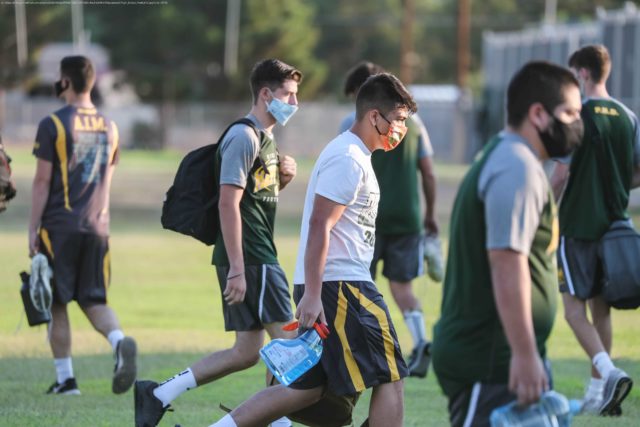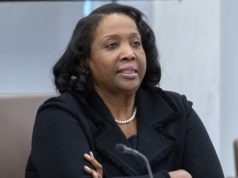It’s been about two weeks since Andy Stefanelli’s football team started gathering again. At first it was just four groups of nine-man pods doing…
It’s been about two weeks since Andy Stefanelli’s football team started gathering again.
At first it was just four groups of nine-man pods doing weight training, split up so they could all do work at once. Last week, skill practices started with the same nine-man pods, and no more than 50 players on the field at once. There are symptom checks and protocols, social distancing and disinfectant. Stefanelli, coach at Our Lady of Good Counsel in Olney, Maryland — the WCAC champion in 2019 and one of the country’s elite high school football programs — has yet to speak to his entire team at once.
It’s safe, or as safe as high school football can be amid the coronavirus pandemic, and that’s really the problem. Because keeping the kids six feet apart isn’t too hard, Stefanelli says, except when they’re between drills or in line. That’s when they naturally drift toward each other and talk.
There’s also the liability waiver families had to sign, which Stefanelli calls, “standard practice everywhere, as people return to doing things in schools and things like that.” Most families signed away.
“If it was a liability waiver for COVID-19, that strikes me as pretty unethical,” said Zach Binney, an epidemiologist at Oxford College of Emory University. “And if I had a kid and his coach asked him to sign that waiver, I would never let that kid play for that coach again.”
Though whether such waivers would hold up in court is unclear, they could become common in high school programs nationwide that hold a fall season. In Florida, the FHSAA discussed having athletes sign waivers acknowledging signs and symptoms of COVID-19, as well as its risks, at a meeting on Monday. Gary Joseph, the coach of Katy High School in Texas, said his athletes haven’t signed any waivers yet, but he wouldn’t be surprised if such a thing were to eventually happen.
Stefanelli knows the coronavirus is serious, but he feels safe and he wants to coach. He hears talk about playing a spring season and thinks it would be a mistake. He knows pushing back the start of the season is a serious possibility and so is canceling everything. Nearby Prince George’s County recently announced its classes would be virtual until at least February 2021, though it’s unclear exactly how that will affect sports. Still, he wants to play, and being in Maryland, where the numbers aren’t too bad, he thinks it’s safe.
“If schools in Texas or Florida and Arizona, where there’s spikes, say, ‘Hey, look, we’re gonna push it off,’ I think at least there’s some data driving that,” he said. “Where it’s happening in areas that it’s not, I wonder what they’re looking at. What’s driving that decision?
“… I think the kids are less susceptible to this. Certainly the severity of it seems to me much, much less for them. I think, again, it doesn’t mean they just throw them back into the normal way of doing things like we used to.
Домой
United States
USA — Sport Fall without football: High school coaches want to play. Epidemiologists say it's...






